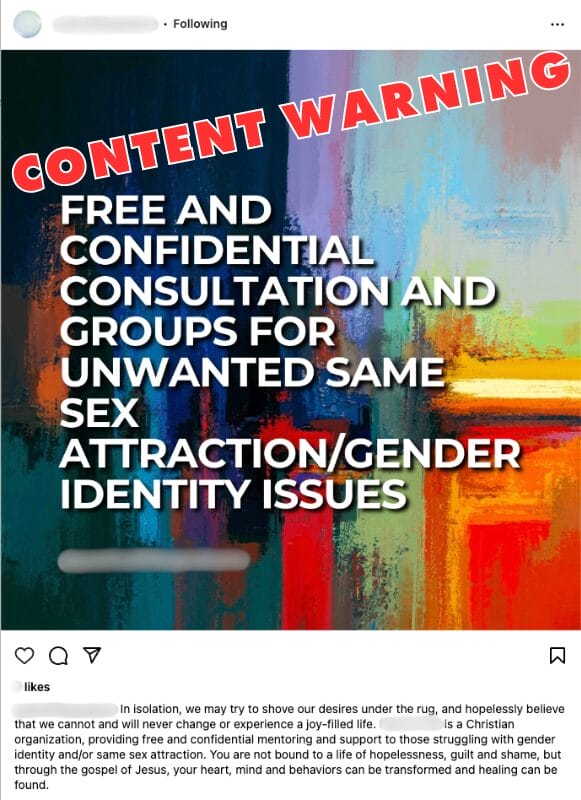Online Anti-LGBTQ Hate Terms Defined: “Unwanted Same-Sex Attraction”
This entry is part of the GLAAD Guide to Anti-LGBTQ Online Hate and Disinformation, an ongoing project to identify some of the most prevalent and egregious terms, tropes, and concepts that are used to harass, attack, and spread malicious misinformation about LGBTQ people on social media. Learn more here.
*CONTENT WARNING*
The example below includes a hateful term, phrases and imagery.
“Unwanted Same Sex Attraction”

“Unwanted same-sex attraction” is a phrase utilized by those who promote so-called “conversion therapy,” the harmful and discredited practice of attempting to change a person’s sexual orientation or gender identity. All major medical, psychiatric, and psychological organizations have condemned “conversion therapy,” and the United Nations has compared it to “torture.”
While “conversion therapy” is the most common term, there are many alternate phrases promoting the practice that continue to gain popularity online. As The Daily Beast reports: “With a new wave of younger, digital-native influencers, the long-discredited ‘ex-gay’ movement—which first surfaced in the 1970s and peaked in the 1990s only to fall away in the early 2000s—is undergoing a rebrand.” So-called ex-gay influencers on TikTok and Instagram “are building social media followings on the back of content that purports to show how it’s possible to ‘overcome’ same-sex attraction.”
One of the primary recommendations of GLAAD’s Social Media Safety Program is that tech companies and social media platforms should better mitigate and moderate these alternate phrases, including: become heterosexual/straight; cure homosexuality; delivered/deliverance from homosexuality; ex gay, ex lesbian, ex LGBT, ex trans; former gay, former lesbian, former LGBT, former trans; free from homosexuality, free from same-sex attraction; gay cure; gender confusion, gender identity issues; gender exploratory therapy; leave homosexuality, leave same-sex attraction; overcome homosexuality, overcome same-sex attraction; reintegrative therapy, reparative therapy; same-sex attracted; seeking to change my sexual orientation; sexual orientation change; sexual reorientation therapy; struggling with homosexuality, struggling with same-sex attraction; unwanted same-sex attraction.
As noted in a 2024 Global Project Against Hate & Extremism (GPAHE) report (Conversion Therapy Online: The Ecosystem In 2023), search engines and platforms are failing to adequately reduce the circulation of harmful anti-LGBTQ “conversion therapy” material and providers, and they must urgently implement new solutions. GLAAD is actively working to urge these companies to better address this content, as well as driving thought-leadership in the field with reports such as this one: All Social Media Platforms Should Have Policy Prohibitions Against Harmful So-Called “Conversion Therapy” Content.
Conclusion
This is just one example of anti-LGBTQ online hate and disinformation. Every term and concept should be evaluated in context. For instance, LGBTQ people and allies may use hashtags with hate terms as counterspeech, or slurs such as “tranny” or “dyke” may be used self-referentially to reclaim them. This guide will be updated on an ongoing basis. Please see the latest GLAAD Social Media Safety Index report for a deeper exploration of the current social media landscape for LGBTQ people, including GLAAD’s recommendations and thought leadership in the field.
How to Report Anti-LGBTQ Online Hate Speech and Harassment
Every major social media platform has policies which prohibit hate and harassment on the basis of protected characteristics, including sexual orientation and gender identity. To learn how to report potentially violative content, check out GLAAD’s LGBTQ Digital Safety Guide, which includes basic tips on helping our community be more safe online.
About the GLAAD Social Media Safety Program
As the leading national LGBTQ media advocacy organization, GLAAD is working every day to hold social media platforms, tech, and AI companies accountable, and to secure safer online spaces for LGBTQ people. The GLAAD Social Media Safety Program produces the highly-respected annual Social Media Safety Index (SMSI) and researches, monitors, and reports on a variety of issues facing LGBTQ social media users — with a focus on safety, privacy, and expression.












